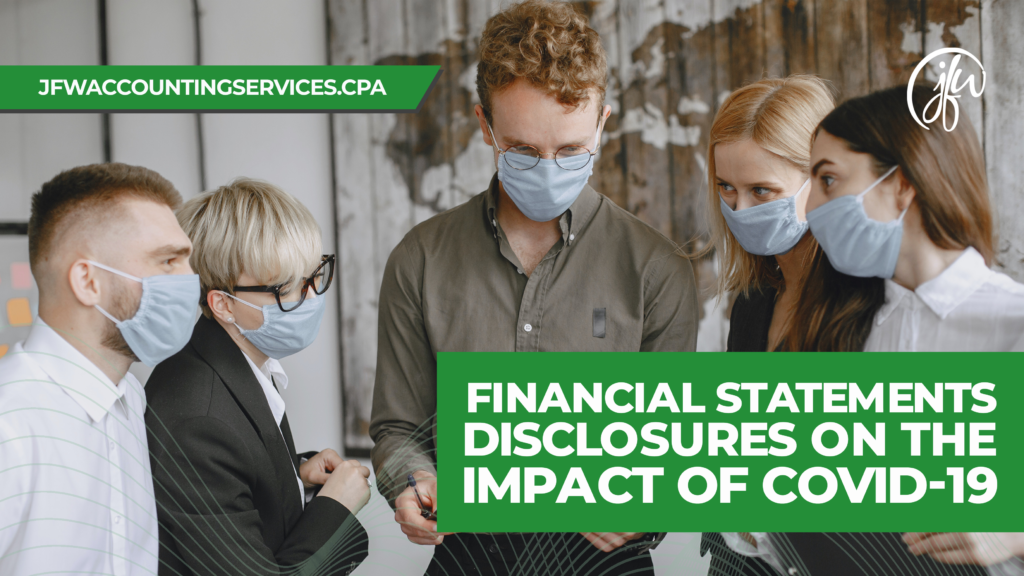Nonprofit organizations exist to serve their communities, members, and neighbors. Local churches, schools, shelters, humane societies, and kids’ clubs are just a few of the types of nonprofit organizations that have had to adjust operations and planning as a reaction to COVIC-19. In this brief post, we take a closer look at the effect of the pandemic on nonprofits and provide some best practices for disclosing the impact.
The Impact Of Covid-19 On Nonprofit Organizations
The pandemic affected every aspect of an individual’s life, from home to work. With respect to nonprofit organizations, the effects and long-term outlook of COVID-19 are still being uncovered. Some of the direct impacts we’ve seen at nonprofit entities include the effects on revenues, people, and finances.
Revenues
Much of a charitable organization’s revenues come from donations received through fundraising. However, the pandemic affected the way nonprofits could fundraise. With little notice, organizations needed to redesign the solicitation of donations. In-person fundraising events were restricted and organizations had to quickly modify their social media and email campaigns as a response. While efforts were strained, overall giving managed to increase by 23%.
Individuals
The world was forced to accommodate stay-in-place orders in response to the Coronavirus. Businesses in every industry adapted by allowing more remote work. The most notable impact for nonprofits was the negative effect on collaboration. Team members rallied around their home offices to continue their efforts toward helping the community and members, but organizations carried the burden of encouraging increased collaboration and teamwork.
Financial
The pandemic affects all organizations differently, but most of them have had to implement changes in their accounting and finance departments. In response to COVID-19, relief efforts provided aid through several new legislations including the Coronavirus Aid, Relief, and Economic Security (CARES) Act. The CARES Act created opportunities for organizations through the Paycheck Protection Program (PPP) and the American Rescue Plan of 2021. The quick response of the Government helped many nonprofits keep their doors open via different modes of aid, like The Shuttered Venue Operators Grant program which encouraged nonprofits to apply for grants for up to 45% of their revenues. While every single program was designed to help individuals, businesses, and organizations in need, they also brought new challenges to financial reporting.
Financial Reporting Best Practices For Organizations In Response To The Pandemic
Disclosing the effect of COVID-19 on financial reports appeared on the long list of challenges for many businesses. For religious organizations and other nonprofit entities, flexibility and rapid learning became the keys to successfully navigating the new financial reporting demand. Some of the best strategies for dealing with the “new normal” regarding financial reports can be found in the following best practices.
Utilize Resources For Disclosures
The pandemic quickly changed everything, but accounting professionals and nonprofit organizational experts worked double-time to provide guidance on the impact of COVID-19 on financial reporting regulations. Check out the following resources for guidance on disclosing pandemic-related issues in financial statements.
This thorough article put together by the accounting experts that partner with the AICPA discusses several examples of how COVID-19 may impact the financial statement notes and disclosures. In one detailed, practical example, the AICPA explains the benefits and consequences of disclosing PPP loan proceeds like a traditional loan.
COVID-19 – Financial Reporting
This informative piece by the AICPA, discusses balance sheet accounts and how the pandemic affected income and assets with regard to subsequent events.
Journal of Accountancy – Financial Reporting and Auditing
This article provides a great resource for all businesses looking to navigate new regulations for earning disclosures, employees, and more.
Consider A Chart Of Accounts Update
Many nonprofits were forced to reevaluate and restructure some of their programs. New programs and new expenses may create the need for an updated chart of accounts. Review the current accounts listed on general ledgers and financial statements with a tax professional or CPA for guidance on finding the right category for newly developed accounts.
Review Financial Planning Patterns
The most effective way nonprofit leaders navigate the “new normal” is by changing day-to-day operations and financial planning. Changes in communication have occurred between organizations and their supporters as well as between leaders and volunteers. The best way to prepare for the changes occurs in the planning phases. Nonprofit leaders, accountants, and finance experts should consider the impacts of COVID-19 in the following areas:
- Interest on forgiven loans
- Changes in payroll
- Donor disclosure requirements
- Repayment plans
- Updated fundraising efforts
- Recording restricted funds
Seek Expert Advice
COVID-19 brought unprecedented circumstances to nonprofits and resilient leaders manage to navigate the changes and updated regulations regularly. However, even the most experienced teams need a little help at times. Be a nonprofit leader that takes advantage of available resources and asks for help when necessary. Partner with other nonprofit organizations in similar industries or contact JFW Accounting Services to incorporate changes into your organization.
Final Thoughts
COVID-19 created the need for evolving processes and procedures for nonprofits all over the world. To minimize the stress associated with the pandemic, organizations should take advantage of available resources, update their chart of accounts, consider expanded financial planning efforts, and consult with JFW Accounting Services for guidance.

Jo-Anne Williams Barnes, is a Certified Public Accountant (CPA) and Chartered Global Management Accountant (CGMA) holding a Master’s of Science in Accounting (MSA) and a Master’s in Business Administration (MBA). Additionally, she holds a Bachelor of Science (BS) in Accounting from the University of Baltimore and is a seasoned accounting professional with several years of experience in the field of managing financial records for non-profits, small, medium, and large businesses. Jo-Anne is a certified Sage Intacct Accounting and Implementation Specialist, a certified QuickBooks ProAdvisor, an AICPA Not-for-Profit Certificate II holder, and Standard for Excellence Licensed Consultant. Additionally, Jo-Anne is a member of American Institute of Certified Public Accountant (AICPA), Maryland Association of Certified Public Accountants (MACPA), and Greater Washington Society of Certified Public Accountants (GWSCPA) where she continues to keep abreast on the latest industry trends and changes.

